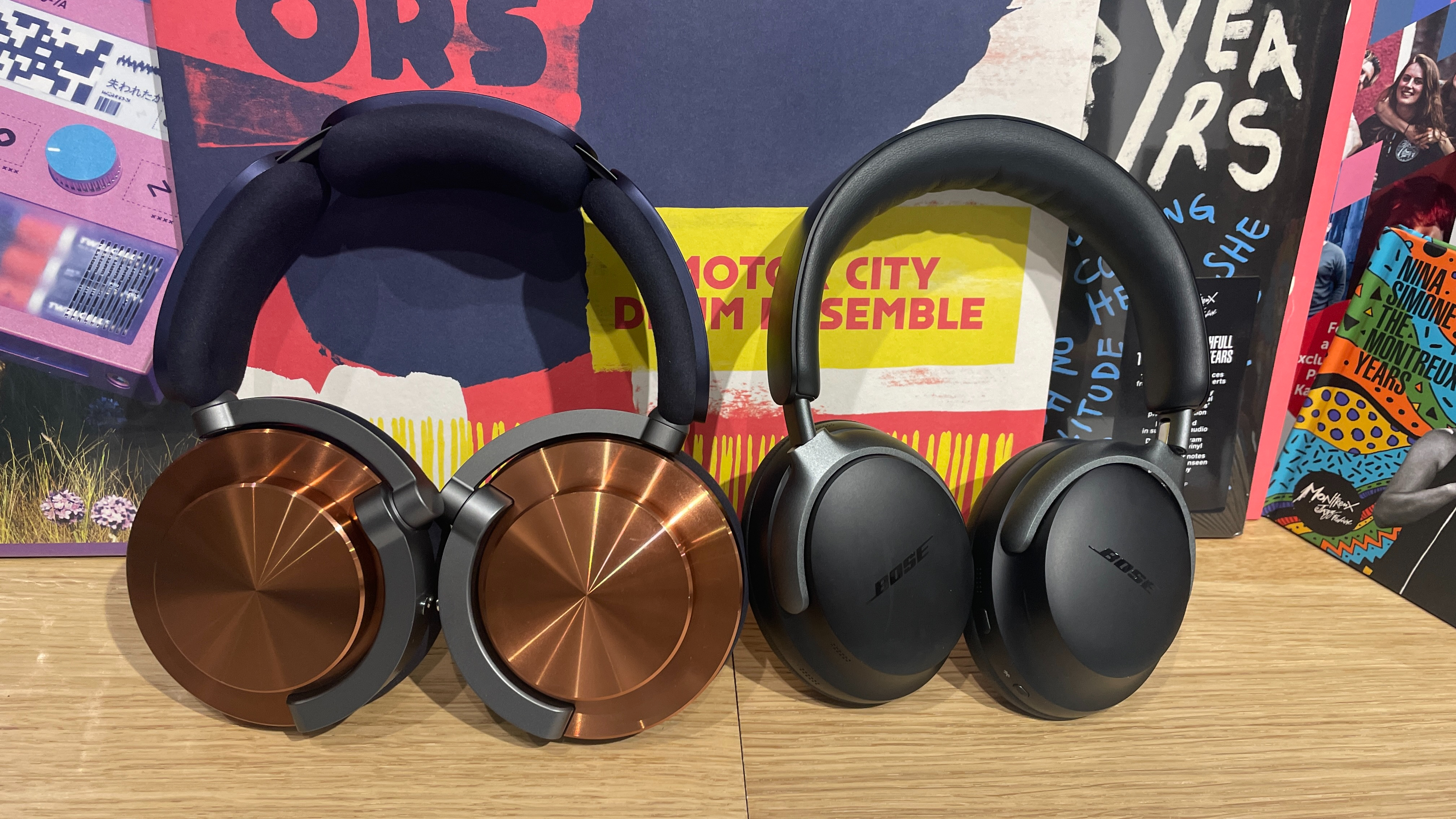
Bluetooth: 5.0
Codec support: SBC, AAC, LHDC
Battery life: 55hrs
Weight: 451g
With an eye-catching design and customisation options, the OnTrac certainly stand out. The sound quality, ANC and battery life are all very good or outstanding, but the slightly safe sonic profile, some usability issues and missing features mean they're not quite ready to compete with the best. Bring on mark two!
For
- Clear, detailed, with even balance
- Mature, neutral tone
- Customisable design is interactive and fun
- Comfortable
- Effective ANC
- Outstanding battery life
Against
- Sound lacks dynamic punch and subtlety
- Could do with better timing and more enthusiasm
- Oversized ear cushions get too hot
- Usability isn’t flawless
- Some premium features missing
Bluetooth: 5.3
Battery life 24hrs
Codec support: SBC, AAC, aptX Adaptive
Weight 250g
The Bose have it. Superior sound quality and the best ANC going seal the deal, plus they're more user-friendly and fold up smaller to stash in a bag. It helps that they're cheaper, too, and more comfortable to wear.
For
- Folding design
- Rich, full-bodied sound
- Punchy, dynamic delivery
- Exceptional noise cancelling
Against
- Immersive Audio is unconvincing
- Expensive compared to key rivals
- Can’t be used via USB-C
Dyson's new OnTrac headphones are out now and are far more consumer-friendly than its air-filtering Zone headphones that came before them.
After a few years of waiting, Bose updated its wireless noise-cancelling over-ear headphone range with the flagship QuietComfort Ultra Headphones in September 2023.
Bose's pair earned the full five stars from us, but the Dyson OnTrac, while promising, couldn't quite reach the same level. Let's compare the two and see how they stack up.
Dyson OnTrac vs Bose QuietComfort Ultra Headphones: price
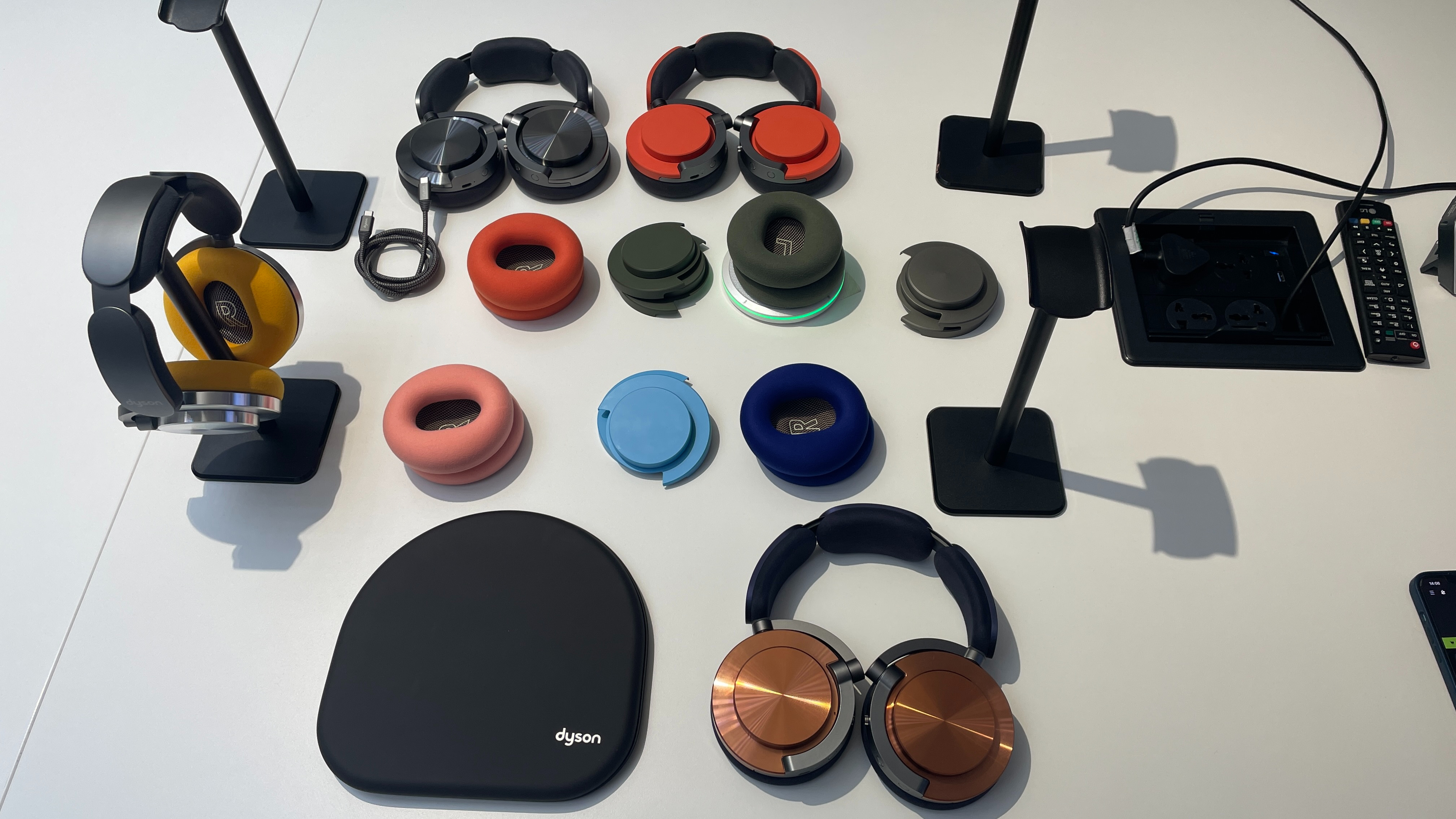
The Dyson OnTrac headphones went on sale on 1st August for £450 / $500 / AU$799. As they are a brand new model, it is unlikely we will see any big discounts immediately, but being priced on the premium side sees them compete with strong contenders.
The Bose QuietComfort Ultra Headphones launched at £450 / $429 / AU$649, although we've seen the price drop to around £375 / $350 / AU$480 and may see more discounts yet.
The Dyson cost more than the five-star Sony’s WH-1000XM5 headphones, which launched at £380 / $399 / AU$550, but are priced lower than the premium Apple AirPods Max, which cost £549 / $549 / AU$899 when they arrived. Of course, the Sony and Apple headphones have been available for some time now, and significant price drops frequently occur.
** Winner: Bose QuietComfort Ultra Headphones **
Dyson OnTrac vs Bose QuietComfort Ultra Headphones: design
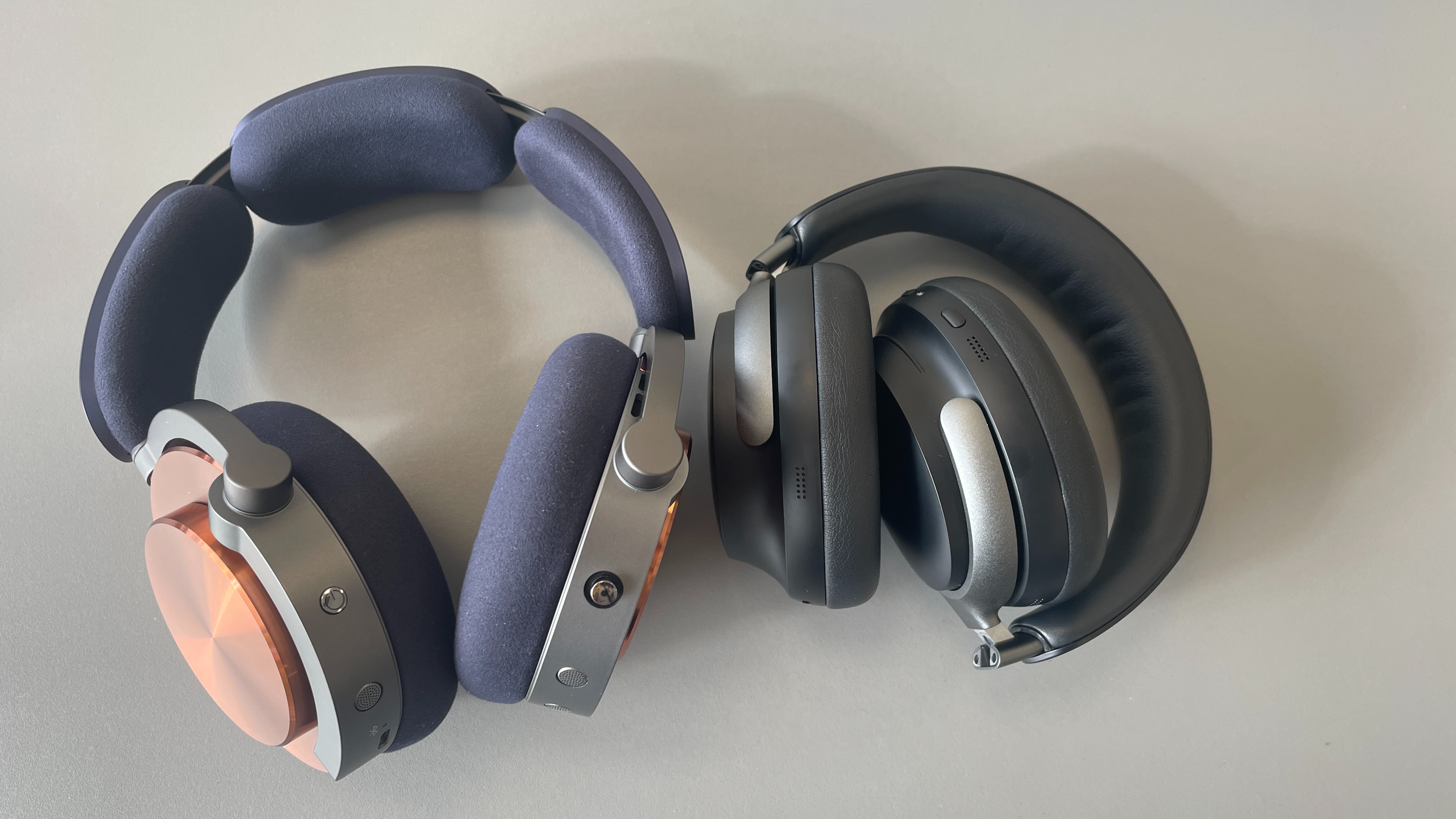
Dyson's new headphones feel quite chunky compared with the Bose. They feature two battery packs on either side of the headband to distribute the weight evenly, but they still feel heavy on your head. You're always conscious that you're wearing quite a large pair of cans
The build quality feels robust and they come with a nice collapsible case. Both the hinges and headband seem like they will withstand a good amount of flex and there's room for ample adjustment in the headband. The ear cushions are bigger than with many other pairs of headphones but still feel comfortable and envelop the ear well. A little too well – they made our ears hot while walking around on a hot day, but also while sitting at a desk in an air-conditioned office. And while the earcups fold down flat, they don't fold inwards, unlike the Bose, making them less portable.
If customisation is your thing, the fun news is that you can easily swap out the ear cushions and outer ear cups of the OnTrac headphones for a wide selection of colourful alternatives. The cushions just snap off and the outer cups have a twist-lock system making the process pretty quick. It's a level of interaction you'd never normally have with headphones, and the choice of colours available is enticing – from bright tones to subtler dark ones. However, this comes at a cost – the extra caps and cushions are £50 per pair. Ouch.
The Ultra Headphones are fully foldable, which is somewhat rare in this price bracket, and makes them easier to carry and accommodate in your bag or luggage when on the move. They also come with a protective carrying case and are available in Black and White Smoke colours – no customisable aesthetics here, unfortunately.
The QuietComfort Ultra Headphones have ample cushioning along the length of the headband and the grip pressure is well-judged. We found the clamping force to be slightly stronger than the Sony WH-1000XM5 during our testing, which may be to the liking of some. The cushioning is comfortable even over longer listening periods and they offer a good level of isolation.
For all the OnTrac's customisation smarts and design originality, the Bose are a better-balanced and more practical design.
** Winner: Bose QuietComfort Headphones **
Dyson OnTrac vs Bose QuietComfort Ultra Headphones: features
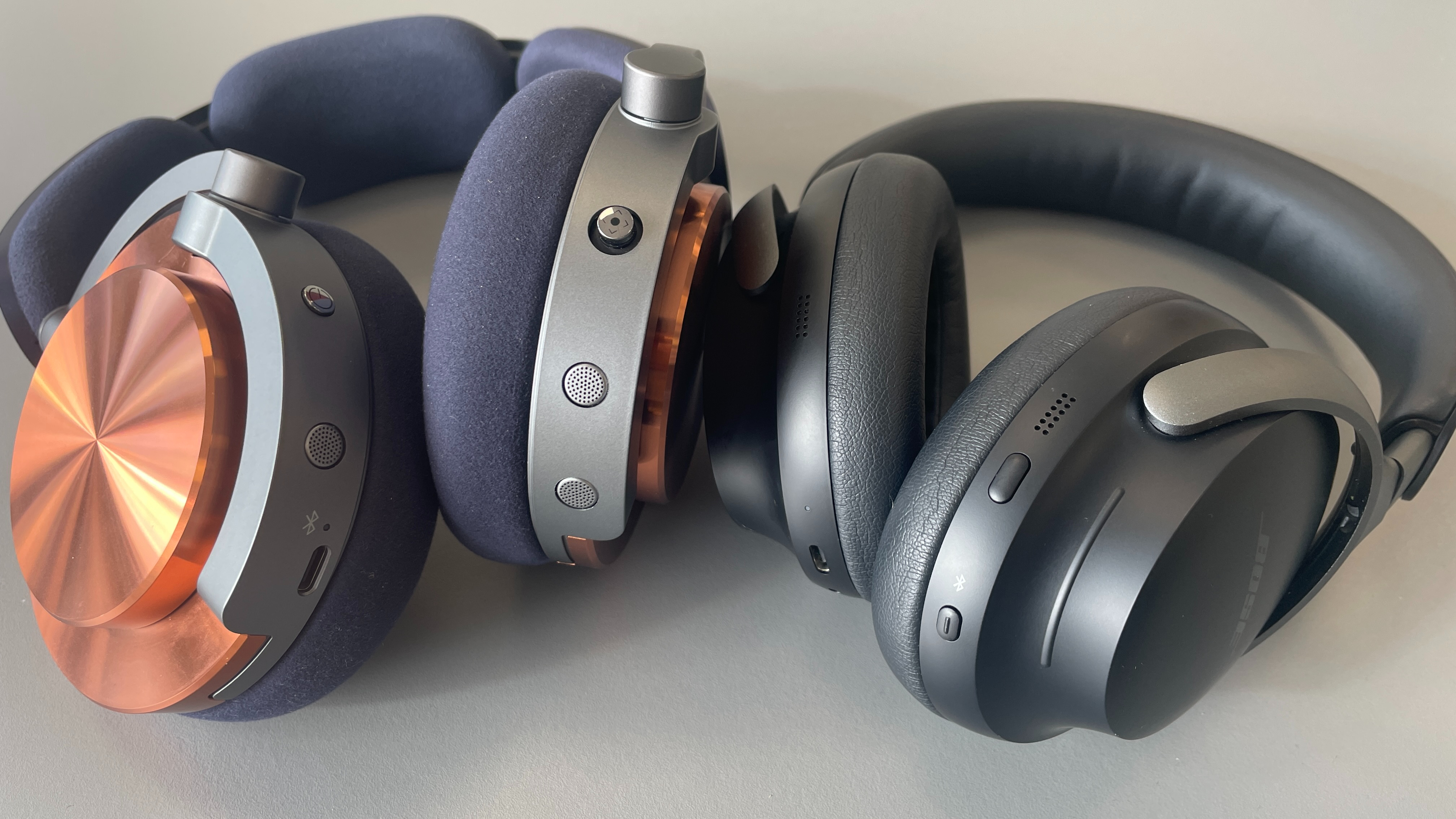
Dyson's new headphones feature physical control buttons for playback and calling on the voice assistant. Alongside these, there are touch controls for swapping between active noise-cancelling and Transparency modes.
The MyDyson app is well laid out and lets you change the ANC and EQ modes. It also includes a graph showing real-time hearing data and will warn you if you are listening at a harmful volume level.
But the real highlight is the battery life. It's a marathon 55 hours with ANC turned on, which blows most other rivals including Bose out of the water. They easily outlasted our week's testing.
However, there's no multi-point Bluetooth, as they only use Bluetooth 5.0. The Bose, which use Bluetooth 5.3, do have multipoint for seamlessly switching between wireless devices.
The OnTrac also have a head detect feature which automatically pauses / resumes music when you take the headphones off / put them back on. It works brilliantly. There are three EQ presets (Neutral, Enhanced, Bass Boost), but no support for spatial audio. They support the standard AAC and SBC Bluetooth codecs, as well as the lesser-known 24-bit LHDC codec. The Bose QuietComfort Ultra Headphones don't support LHDC, but do play nice with aptX Adaptive.
The Ultra Headphones feature a capacitive touch strip for controlling volume and accessing shortcuts. There's also a general multi-functional button for controlling listening modes, answering calls and pausing audio.
They include Qualcomm’s Snapdragon Sound Technology suite, which gives them latency and stability boosts via aptX Adaptive codec support. The battery can't match the OnTrac, offering 24 hours of life during standard ANC use and 18 hours when ‘Immersive Audio’ is engaged.
There's compatibility with the Bose Music App and an ‘Immersive Audio’ mode, which is Bose’s take on spatial audio and presents sound in a 3D environment. It comes with two further modes, ‘Motion’ and ‘Still’. In the ‘Still’ setting, audio is meant to sound as if it is “coming from two stereo speakers in front of you that stay where they are when you move your head”. “Motion” mode aims to make audio sound like “it's coming from two stereo speakers in front of you that follow the movements of your head”. We found the Immersive Audio modes unconvincing during our review, and especially aren't fond of it draining so much crucial battery life.
The Dyson OnTrac don't have any spatial audio capabilities, though given Bose's implementation, that's no great shame.
** Winner: Bose QuietComfort Ultra Headphones **
Dyson OnTrac vs Bose QuietComfort Ultra Headphones: noise cancelling
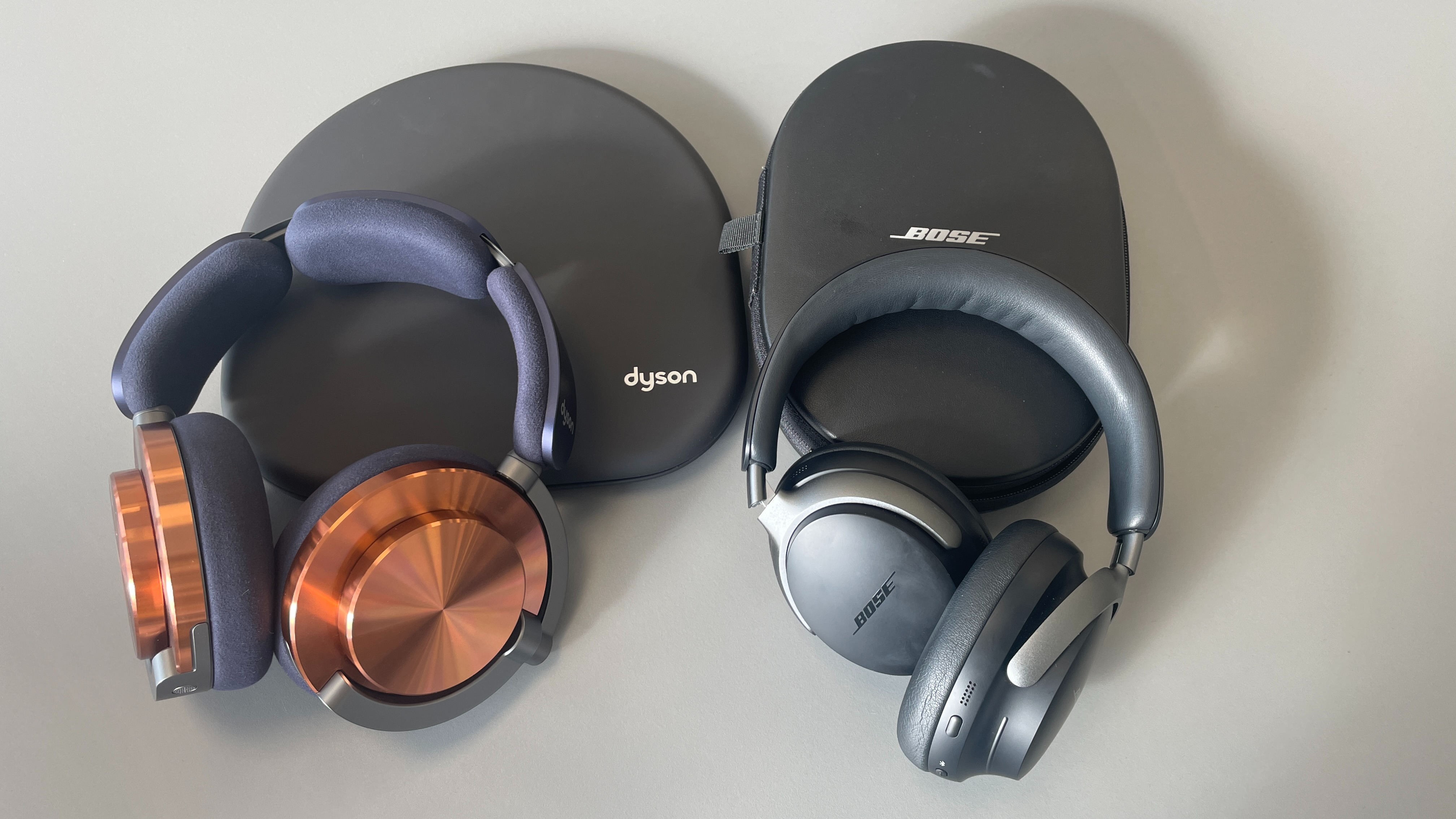
The new Dyson OnTrac headphones offer ANC and Transparency modes. The cans feature eight mics that constantly monitor external noise – Dyson claims 384,000 times per second – to optimise the ANC quality. Unfortunately, you can't manually adjust ANC levels like you can on the Bose, but Dyson has made it clear that it is aiming high and wants its headphones to be crowned as the best for ANC. They're not far off.
They do a good job of dimming general environmental noise using the full “isolation” ANC mode, with engine rumbles and passing traffic barely registering. Even sudden, sharper noises are dispatched effectively. In fact, they're almost as good as the Bose QuietComfort Ultra Headphones – the Bose just edge it in smoothing out the lower frequencies. Still, it's an impressive debut for Dyson.
Their transparency mode works well, too, keeping artificial noise to a minimum while allowing in outside sounds. They also don't have that unpleasant ‘vacuum-like’ feeling when ANC is turned on.
The QuietComfort Ultra Headphones are currently our top ANC choice for the best wireless headphones, and feature class-leading noise-cancelling tech that you would expect from Bose. The company states that its new headphones achieve noise cancellation via passive sealing of the earcups combined with proprietary active electronics. This active circuitry uses microphones on the inside and outside of both earcups to cancel out external noise.
In our full review of the Bose QuietComfort Ultra Headphones, we were impressed with the noise-cancelling capabilities. Background rumbles are drastically reduced and the sound of the London Underground during our daily commutes is far less abrasive and intrusive.
There are a few options within the ANC settings, namely Quiet and Aware modes. Quiet mode offers full noise cancellation, while the Aware setting allows full transparency so you can hear your surroundings while still enjoying audio in stereo sound. There's also an additional ActiveSense feature which only activates noise cancellation when a loud or sudden noise occurs nearby.
The OnTrac's call quality is decent too. Voices are clear, detailed and are projected well, from both sides of a phone call. They do pick up a bit of swirling wind noise, but it doesn't impede conversations. The Bose QC Ultra Headphones make voices sound a bit more solid and rounded, but the Dysons are clearer and crisper.
** Winner: Bose QuietComfort Ultra Headphones **
Dyson OnTrac vs Bose QuietComfort Ultra Headphones: sound
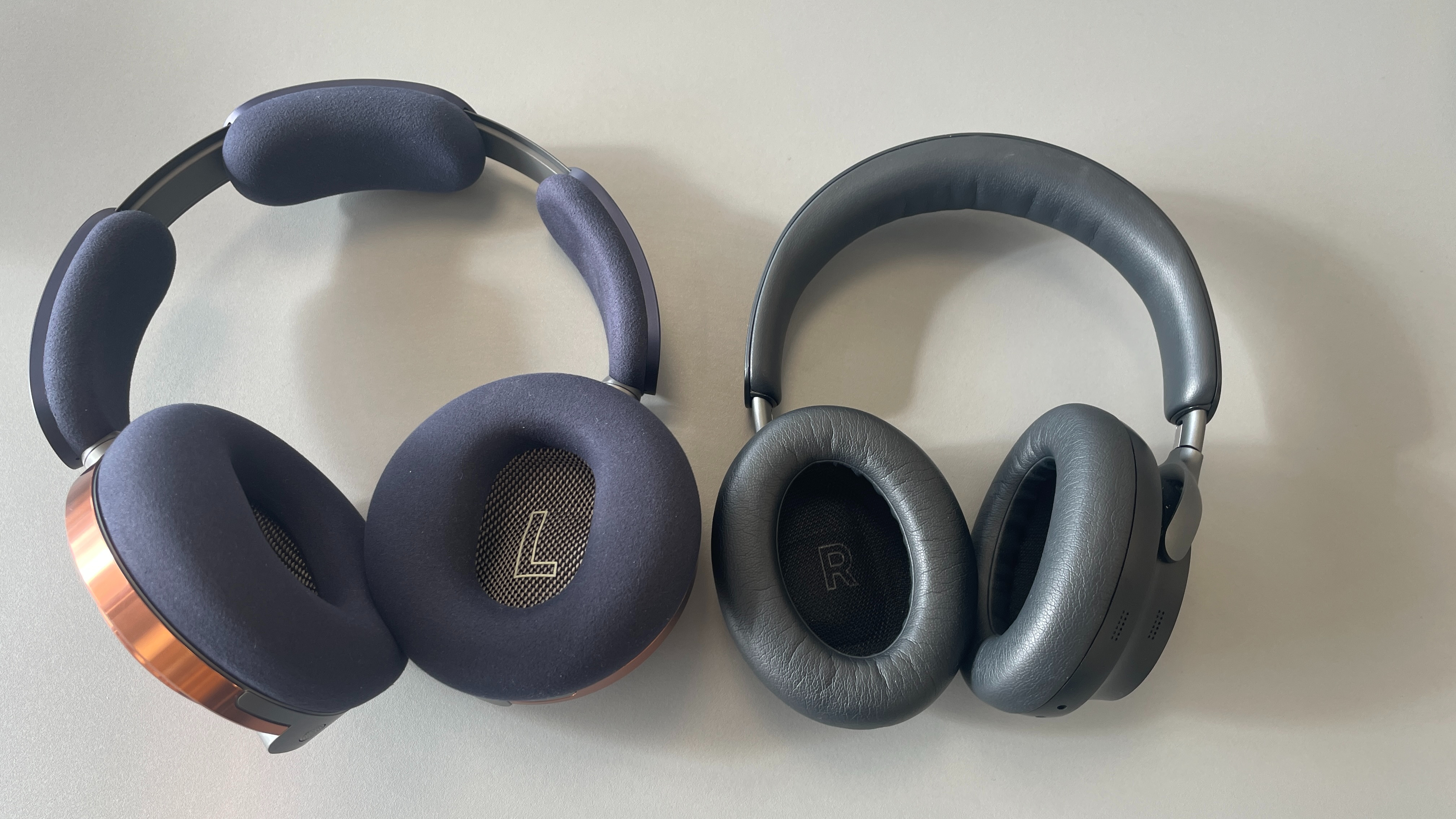
Despite the Dyson OnTrac's bold looks, they're a surprisingly clear and clean listen. The presentation is neatly organised and evenly balanced, with a decent amount of detail. They handle voices particularly well.
But they could do with more solidity throughout. Their sensible balance is a bit too restrained for our liking, and lacks personality. The ‘Enhanced’ EQ mode injects a bit of zest to the music, but we find that the OnTrac are lacking in dynamic punch and subtlety overall. The Bose QuietComfort Ultra Headphones have more authority. The Dysons are just a bit safe.
The Ultra Headphones, however, are precise and punchy, and convey every genre of music with enthusiasm. They deliver rich highs and deep lows with refinement, while drums hit hard and fast. We said in our review that "every note is tightly defined and they have no problem painting texture and giving them shape". Timing is terrific, and the overall natural balance is combined with a level of refinement and excitement that really impresses.
** Winner: Bose QuietComfort Ultra Headphones **
Dyson OnTrac vs Bose QuietComfort Ultra Headphones: verdict
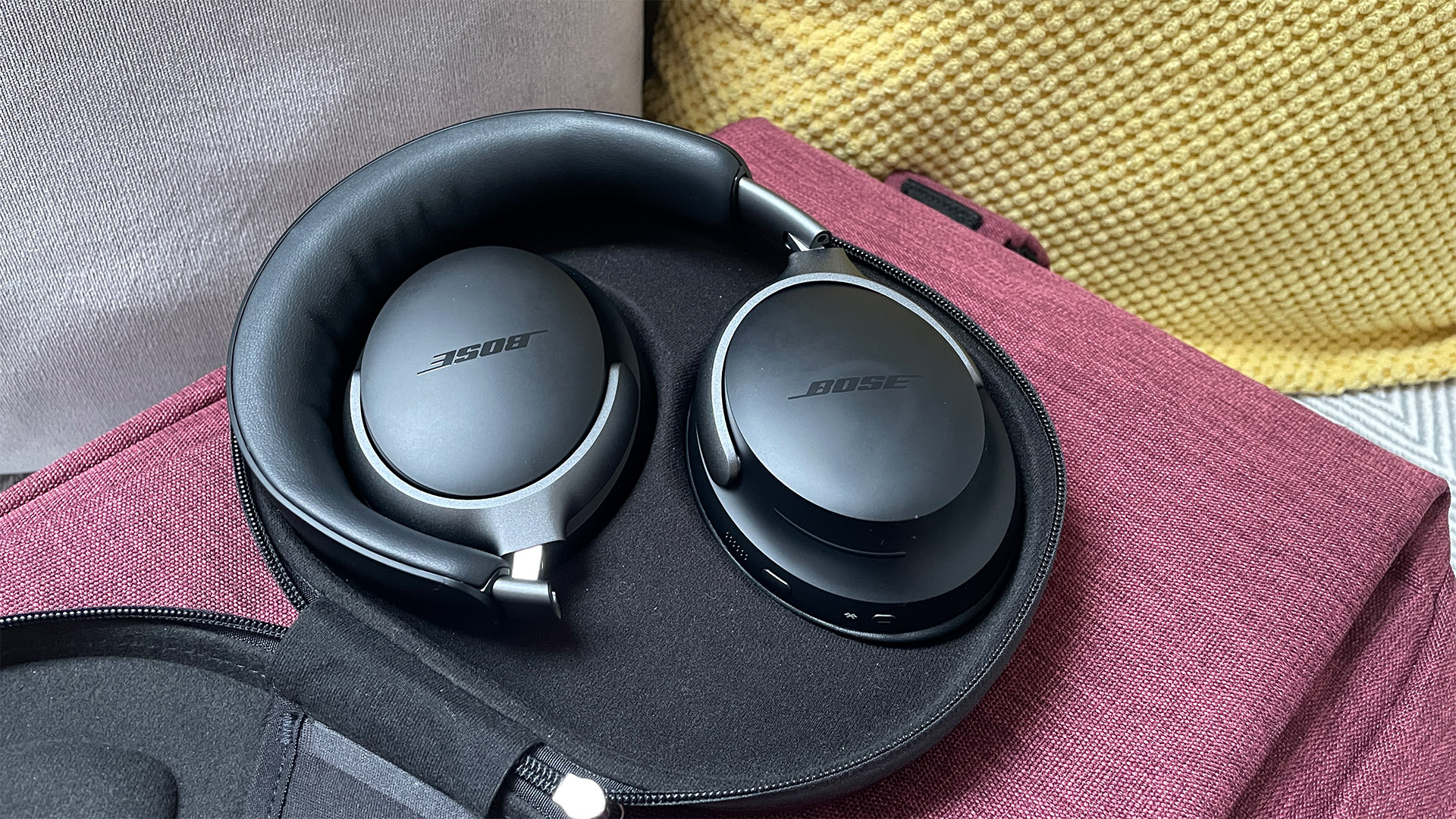
It's always tough for a new entrant to take on the best over-ear headphones at this price. Just ask Sonos. But Dyson has made a promising debut. Sound is neutral, though a little too safe for our liking, and the design certainly stands out. The ANC is a real highlight, almost equalling market leader Bose, and the battery life one of the best around.
But ultimately the Bose are the better buy. Their full-bodied, dynamic sound and unbeatable noise-cancelling abilities are what earned them a five-star review, even if their Immersive Audio modes left us unconvinced.
Still, a new challenger always keeps things interesting, and just goes to show even the best can't rest at this level.
MORE:
Read the full Bose QuietComfort Ultra Headphones review
Dyson OnTrac vs Apple AirPods Max: how do these premium wireless headphones compare?
Check out the best wireless headphones we recommend







